Last Sunday, I stayed in bed till noon. Didn’t answer texts, didn’t do laundry, didn’t even get up to make coffee. And still, I felt tired. Not sleepy, not bored, just… done. Like my brain was a phone on 1% battery, flickering to stay alive. The worst part? I kept calling myself lazy. I mean, I did nothing all day shouldn’t I feel refreshed? But it wasn’t laziness. It was emotional exhaustion, my nervous system waving a white flag, begging for a break 😴

If you’ve ever felt this way like you’re dragging yourself through life, even when you’re “resting” you’re not alone. Emotional exhaustion isn’t about being weak or slacking off; it’s your body and mind screaming for relief from too much stress, too many demands, or too little space to just be.
In this article, we’re gonna dive into what emotional exhaustion feels like, why it happens, and how to recover without feeling like you’re failing. We’ll also tackle big questions like, “Am I just lazy?” and “Why is crying so exhausting?” with real stories and science to back it up. Ready to give yourself some grace? Let’s get started 😊

What Is Emotional Exhaustion?
Emotional exhaustion is that bone-deep tiredness you feel when life’s been too much for too long. It’s not just being sleepy or needing a nap it’s a mental and emotional drain that makes even simple stuff, like replying to a text or laughing at a friend’s joke, feel like climbing a mountain. According to the Mayo Clinic, it’s a key part of burnout, where chronic stress leaves you feeling depleted, detached, and sometimes hopeless.
Symptoms of emotional exhaustion include:
- Feeling constantly tired, even after sleep.
- Lack of motivation or interest in things you used to love.
- Irritability or snapping at people for no reason.
- Trouble focusing or making decisions.
- Physical signs like headaches, tight shoulders, or stomach issues.
- Feeling numb or disconnected, like you’re on autopilot.
“You’re not lazy. You’re just running on emotional fumes.”
– Unknown, but painfully true.
Am I mentally tired or just lazy?
Here’s the deal: laziness is when you choose to avoid effort, even when you’ve got the energy. Emotional exhaustion is when you want to do stuff but feel like you’re running on empty. If you’re beating yourself up for “slacking,” but deep down you’re just too drained to move, it’s probably exhaustion, not laziness. I used to think I was lazy for skipping workouts, but then I realized I was so stressed from work, I had nothing left to give. 😣

Why Do I Feel So Drained?
So, why do some of us get emotionally drained so easily? It’s not just one thing it’s a mix of life’s pressures piling up. Here’s what might be going on:
- Chronic Stress: Work deadlines, family drama, or financial worries can keep your nervous system in overdrive, leaving you wiped out.
- People-Pleasing: If you’re always saying yes to others, you’re draining your emotional tank. I used to take on every favor, then wonder why I was so fried.
- Lack of Boundaries: Not setting limits like answering work emails at midnight can sap your energy. Check out our guide on setting digital boundaries for tips.
- Past Trauma: Unresolved pain from childhood or past relationships can make you more sensitive to stress, per Psychology Today.
- High Empathy: If you’re super empathetic, you might absorb others’ emotions, leaving you drained. My friend Sarah, a nurse, says she feels everyone’s pain at work, and it’s exhausting.
- Life Transitions: Big changes like moving, starting a new job, or a breakup can overload your system, especially in your 20s and 30s.
I remember one week where I was juggling a new job, a sick parent, and a friend’s crisis. By Friday, I could barely get out of bed, even though I’d slept 8 hours. It wasn’t laziness it was my brain saying, “Enough already!” 😅

The Science Behind Emotional Exhaustion
Let’s get nerdy for a sec. Emotional exhaustion isn’t just “feeling tired” it’s your nervous system hitting its limit. Your autonomic nervous system (ANS) has two main parts: the sympathetic nervous system (SNS), which handles “fight or flight,” and the parasympathetic nervous system (PNS), which is all about “rest and digest.” When you’re under chronic stress, the SNS stays on high alert, pumping out cortisol and adrenaline like it’s a party. This keeps you wired but eventually burns you out, leaving the PNS struggling to calm things down.
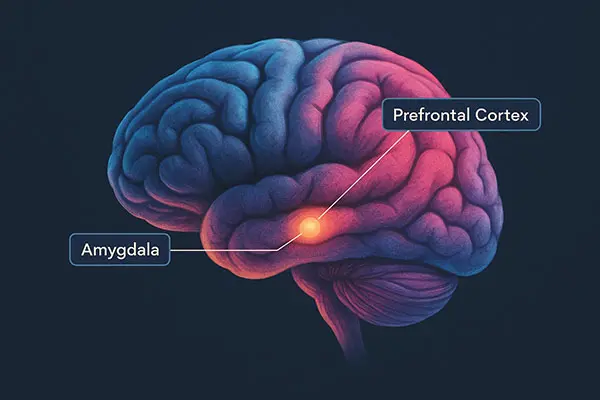
Scientific American explains that chronic stress can shrink areas of your brain like the prefrontal cortex (decision-making) and hippocampus (memory), whileover-activating the amygdala (emotions). This messes with your ability to regulate feelings, making you feel numb or irritable. Over time, it can even increase risks for anxiety, depression, and physical issues like heart disease yikes!
A 2018 study in Frontiers in Psychology found that emotional exhaustion is linked to a 30% increase in stress-related health problems. So, when you’re drained, it’s not just in your head it’s your whole system begging for a break
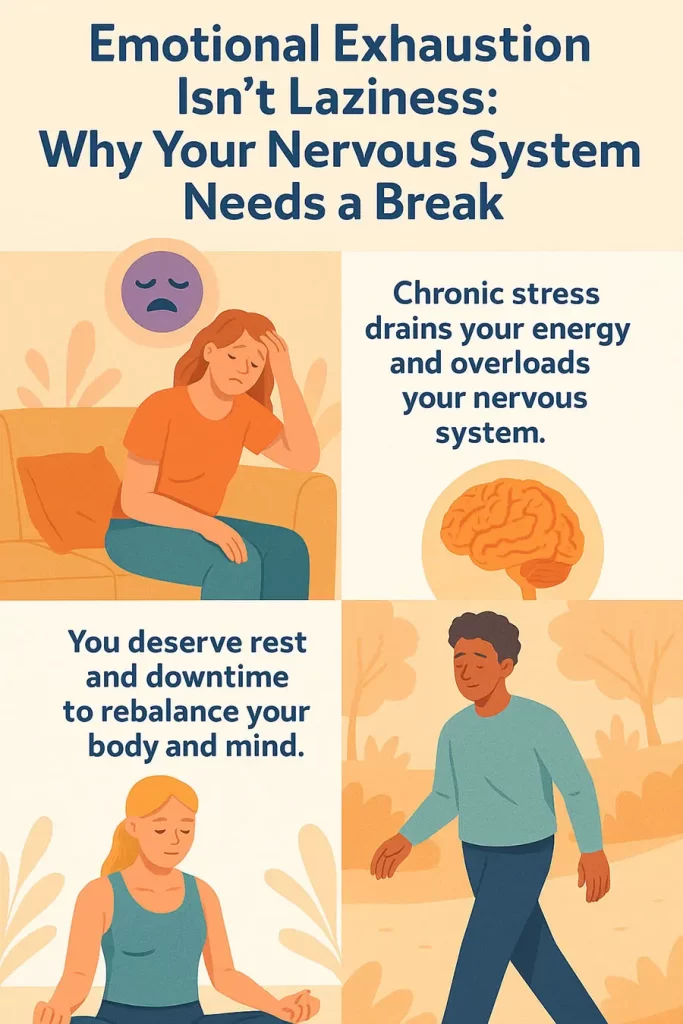
Emotional Exhaustion vs. Burnout
Is emotional exhaustion a burnout?
They’re related but not quite the same. Emotional exhaustion is a core part of burnout, but burnout’s a bigger beast. According to the World Health Organization, burnout is a syndrome from chronic workplace stress, with three parts:
 Emotional exhaustion (feeling drained).
Emotional exhaustion (feeling drained). Depersonalization (feeling detached or cynical).
Depersonalization (feeling detached or cynical). Reduced personal accomplishment (feeling like you’re failing).
Reduced personal accomplishment (feeling like you’re failing).
You can be emotionally exhausted without full-blown burnout, especially if you catch it early. For example, I was exhausted from work stress but still felt good about my job that’s exhaustion, not burnout. If you’re starting to feel cynical or useless, though, you might be tipping into burnout territory. Either way, it’s a sign to slow down. 😊
The Role of Crying in Emotional Release
Crying’s a weird one, right? It can feel so good but also leave you wiped out. Why is crying so exhausting? It’s because crying’s a full-body experience. When you cry, your body releases stress hormones like cortisol, which can be cathartic but also draining. Healthline says crying activates your parasympathetic nervous system, helping you calm down, but the emotional and physical effort can leave you feeling like you ran a marathon.
Is it better to cry or hold it in?
Holding in tears can trap stress in your body, making you feel tense or numb. Crying lets it out, like opening a pressure valve. But if you’re crying a lot, it might signal deeper issues like depression or anxiety, so don’t ignore it.

Is it bad to go to sleep after crying?
Nope, it’s usually fine. Crying can be a release, and sleep can help your body recover. But if you’re crying from distress, try calming techniques like deep breathing first to ease into rest. I’ve fallen asleep after a good cry, and it felt like hitting reset though I woke up with puffy eyes! 😅
How many times does the average person cry a year?
Studies vary, but adults cry anywhere from 2 to 35 times a year, with women crying more often than men on average, per Medical News Today. It depends on your personality, stress levels, and life events

Real Stories: When Exhaustion Hits Hard
Let’s make this real with some stories (names changed for privacy):
- Maya, 27: “I’m a teacher, and last year, I was so burned out from grading and parent meetings, I could barely get out of bed on weekends. I thought I was lazy, but my therapist said it was emotional exhaustion. I started taking one day a week to do nothing no phone, no plans. It’s helped me feel human again.”
- Liam, 32: “After my dad got sick, I was the ‘strong one’ for my family. I didn’t realize how drained I was until I snapped at my partner for no reason. Journaling and short walks helped me process without feeling guilty.”
- Sam, 29: Sam, who’s queer, felt exhausted from navigating family expectations and online hate. “I’d spend hours defending myself on social media, then feel empty. Joining a queer support group gave me a safe space to recharge.”
These stories show that emotional exhaustion isn’t a personal failing it’s a signal to slow down and care for yourself. 😊
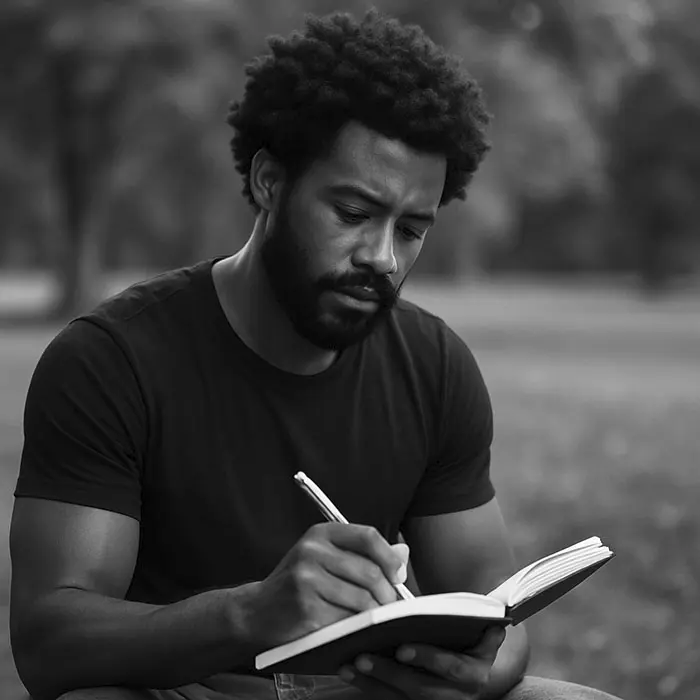
How to Recover from Emotional Exhaustion
How long does it take to recover from emotional exhaustion?
It varies. For some, a few weeks of intentional rest and self-care can make a difference. For others, especially with deep burnout or trauma, it might take months or longer with therapy. A 2020 study in Journal of Occupational Health found that recovery can take 4-12 weeks with consistent self-care and support. The key is patience your nervous system needs time to heal.
Here’s how to start:
- Rest Without Stimulation: Take breaks from screens and noise. I started doing “silent Sundays,” where I’d read or nap without my phone. It’s like a reset button.
- Set Boundaries: Say no to non-essential tasks. Our guide on saying no without guilt has great tips.
- Practice Mindfulness: Try 5-minute deep breathing or meditation. Apps like Calm have guided sessions that are super chill.
- Move Your Body: Gentle exercise like yoga or walking can release tension. I do a 15-minute walk daily, and it’s like my brain exhales.
- Connect with Others: Talk to a friend or therapist. Sharing my stress with a buddy made me feel less alone.
- Prioritize Sleep: Aim for 7-8 hours a night. A consistent bedtime routine helped me sleep better, even on tough days.
Objection: “These won’t work for me.”
I get it when you’re exhausted, nothing feels doable. But start small. Even one deep breath or a 5-minute walk can shift things. It’s not about perfection it’s about progress 😊

Emotional Exhaustion in the LGBTQ+ Community
For folks in the LGBTQ+ community, emotional exhaustion can hit harder due to unique stressors like discrimination, family rejection, or the pressure to “prove” your identity. A friend of mine who’s trans said they felt drained from constantly explaining their pronouns at work.
Joining an affirming online community and setting boundaries like limiting time with unsupportive people helped them recharge. If you’re part of the community, seek out safe spaces, like queer-friendly support groups or therapists, to process stress without judgment. It’s like giving your nervous system a warm hug. 😊

When to Seek Help
If you’ve tried self-care for a few weeks and still feel drained, or if exhaustion’s messing with your work, relationships, or health, it’s time to talk to a pro. A therapist can help you unpack root causes like trauma or depression. NAMI suggests cognitive behavioral therapy (CBT) or mindfulness-based therapy for managing exhaustion. Don’t be afraid to reach out it’s a sign of strength, not weakness.
Conclusion
Emotional exhaustion isn’t laziness it’s your nervous system begging for a break. Whether it’s from work stress, family pressures, or just life’s chaos, that drained feeling is a signal to slow down, not a sign you’re failing. By recognizing the symptoms, setting boundaries, and practicing self-care, you can start to recharge and feel like yourself again. You don’t have to do it all at once just take one small step, like a quick walk or a moment of silence. Your energy’s worth it, and so are you.
Feeling drained? Try one self-care tip today and share your story in the comments. Let’s support each other to find relief! 😊

Resources related to this topic
- Mayo Clinic: Defines burnout as emotional and physical exhaustion from prolonged stress, and explains how to identify and act on it
- Psychology Today: Defines psychological trauma as emotional distress caused by events that overwhelm coping capacity
- Scientific American: Examines how chronic stress impacts brain function, including memory and emotional control
- Healthline: Lists physical and emotional benefits of crying, such as emotional release, stress relief, and self-soothing
- Medical News Today: Explains how frequent, unexplained crying can signal conditions like burnout, anxiety, or depression
Related articles I recommend not to miss
FAQ
Laziness is choosing to avoid effort when you have energy; emotional exhaustion is wanting to do things but feeling too drained. If you’re unmotivated despite trying, it’s likely exhaustion, not laziness.
It’s a deep mental and emotional drain constant tiredness, lack of motivation, irritability, trouble focusing, and sometimes physical symptoms like headaches.
Chronic stress, people-pleasing, lack of boundaries, past trauma, or high empathy can make you more prone to emotional exhaustion.
It varies weeks to months, depending on severity. Consistent self-care, like rest and therapy, can speed up recovery.
It’s a core part of burnout, but burnout also includes detachment and feeling ineffective. You can be exhausted without full burnout.
Crying releases stress hormones and involves physical effort, which can leave you drained but also relieved.
Adults cry 2-35 times a year, depending on personality and life events, with women crying more often than men on average.
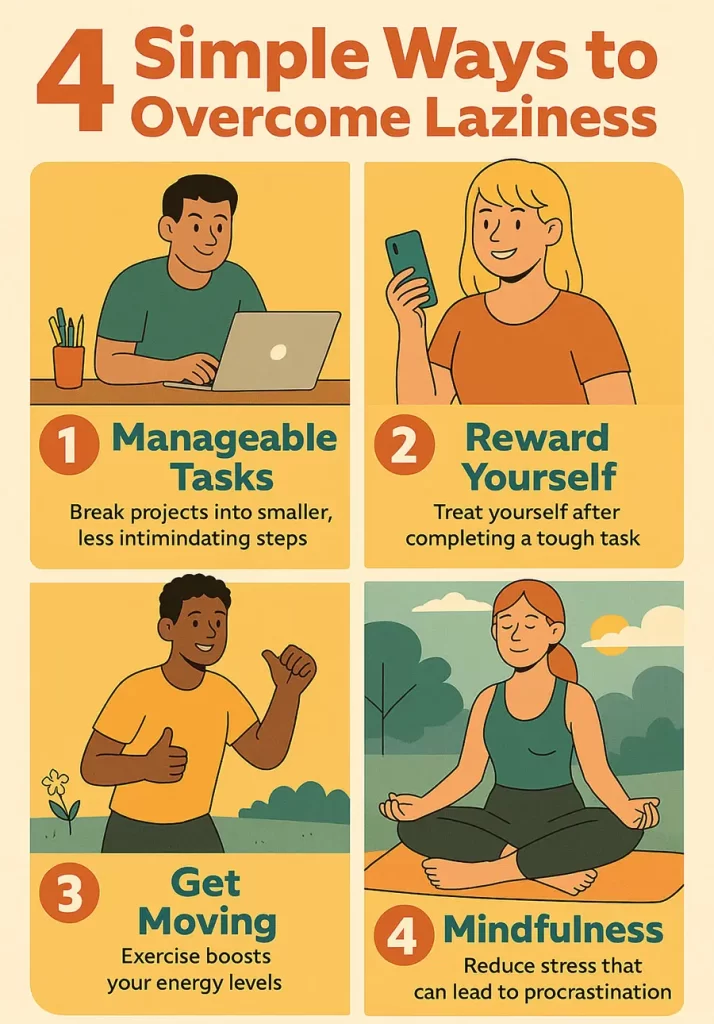
How to Start Recovering from Emotional Exhaustion
- Recognize the Signs: Notice if you’re feeling drained, irritable, or detached it’s a signal to slow down.
- Prioritize Rest: Take breaks from screens and noise, like a quiet walk or nap.
- Set Boundaries: Say no to non-essential tasks to protect your energy.
- Practice Mindfulness: Try 5-minute deep breathing or meditation to calm your nervous system.
- Move Your Body: Do gentle exercise like yoga or walking to release tension.
- Connect with Support: Talk to a friend or therapist about your feelings.
- Be Patient: Recovery takes time celebrate small wins, like feeling a bit more energized.
✨ Last updated on 03.08.2025
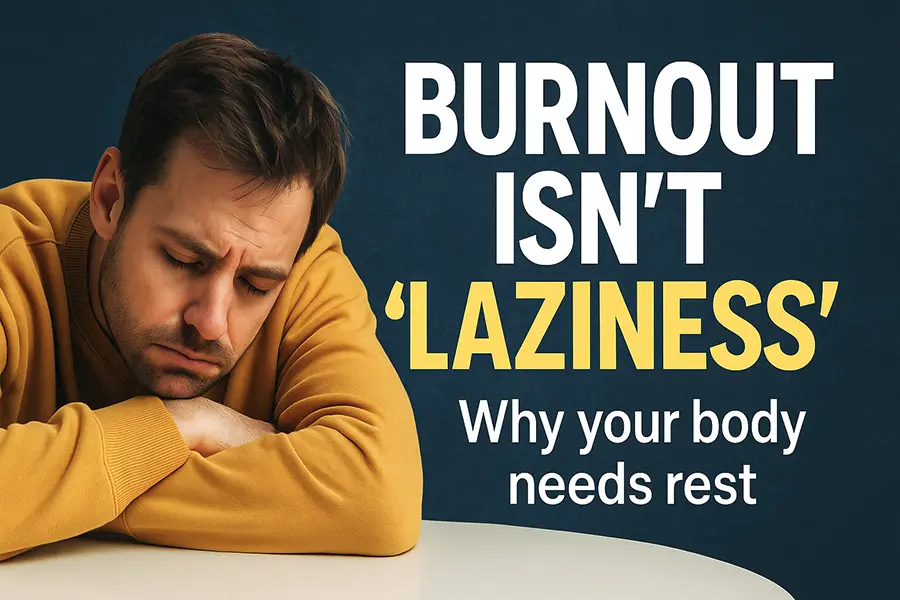










Leave a Reply